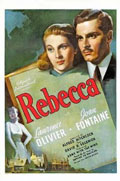
Directed by
Alfred Hitchcock
130 minutes
Rated PG
Reviewed by
Bernard Hemingway

Rebecca
Hitchcock's first Hollywood film after crossing the Atlantic was based on the Daphne du Maurier story and is a polished effort in the tradition of the Gothic romantic melodrama with virtually no trace of Hitchcock’s own distinctive directorial style (unless you consider the use of back-projection an example of such).
Joan Fontaine gives probably the best performance of her career (although Oscar-nominated she did not win for this but rather for another Hitchcock film, Suspicion, in 1941) as the newly-wed Mrs de Winter whose blue-blood husband (Laurence Olivier) is supposedly grieving over the death of his first wife, Rebecca. After a whirlwind romance in Monte Carlo, de Winter takes his new, rather timid wife back to his manorial home, Manderley, where she has to deal with the mystique of Rebecca (rather cleverly Hitchcock never shows us any image of Rebecca) and the very scary Mrs Danvers (Judith Anderson), neither of which she does very well.
In its day the film picked up the Oscars for Best Picture and cinematography (George Barnes) and was a box office bonanza for producer David O. Selznick. Generally faithful to Du Maurier's novel, although to placate the Hays office, Rebecca’s demise is an accident rather than the actual murder it was in the novel, it is in many ways a classic “woman’s picture” with an upper-class milieu, a dashingly handsome male lead and a woman who must rise to the occasion and win her husband’s love. If Fontaine is vulnerable and Olivier dashing however it is Judith Anderson's chilling housekeeper, Mrs. Danvers that most people will remember. The film has well-crafted plot that gives us an unexpected turnaround at the end of the second act then a final twist in the last stages in which George Sanders turns up playing one of his many superciliously caddish roles. Franz Waxman’s lyrical score starts with the credits and is an almost continuous presence.
FYI: The ending for the film, which is different from the novel, is remarkably similar to that of Citizen Kane although as that film was released the same year it is presumable purely coincidental. Hitchcock filmed two other Du Maurier works - Jamaica Inn in 1939 and The Birds in 1963
Want something different?





